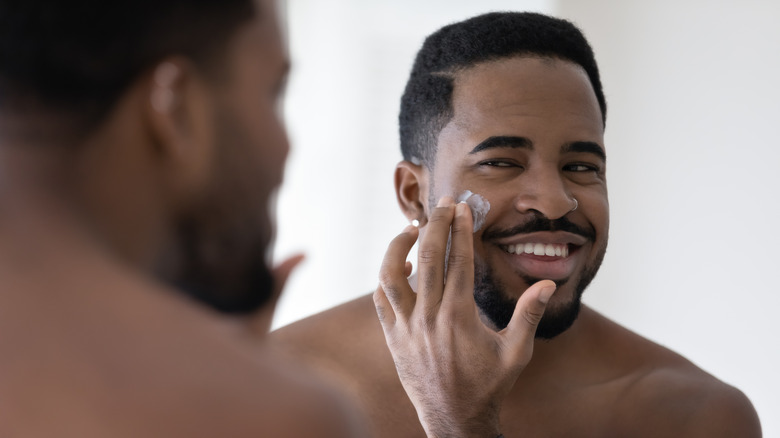Can Vitamin D Help Treat Acne?
There it is: another red, swollen pimple. Anyone who has suffered through acne breakouts knows how stressful — and downright annoying — these blemishes can be. Besides temporary spots, acne can also lead to long-term scarring and changes in skin pigmentation, according to Mayo Clinic. Acne is also associated with poorer mental health outcomes. According to the American Academy of Dermatology Association, many people who struggle with the skin condition also experience depression, anxiety, and low self-esteem.
Thankfully, a wide variety of treatment options are available to reduce acne breakouts, including certain vitamins. Vitamin C has been found to help with acne-related inflammation, hyperpigmentation, and scars, especially when applied topically (per Healthline). Accutane, one of the strongest medications available for severe acne, is a natural vitamin A derivative, dosed in quantities much higher than over-the-counter vitamin supplements (per the American Osteopathic College of Dermatology).
In addition to vitamin A, a 2014 study published in Cutaneous and Ocular Toxicology revealed that people with acne are more likely to be deficient in vitamin E and zinc, suggesting that consuming more of these nutrients could help prevent or treat acne.
Vitamin D is also believed to improve the look and condition of the skin. As Dr. Joshua Zeichner, director of cosmetic and clinical research in dermatology at Mount Sinai Hospital, told Byrdie, "Generally speaking, skin health is best improved when your body has a full store of vitamin D." But how does the vitamin affect stubborn acne?
Vitamin D may treat acne inflammation
While discussing the skin benefits vitamin D offers, dermatologist Dr. Nikhil Dhingra explained to Byrdie, "The most important practical use of Vitamin D in the skin to date is as a mild-to-moderate anti-inflammatory ... in the treatment of conditions like psoriasis, eczema, and vitiligo." There's growing evidence that these anti-inflammatory properties may also extend to acne.
In one 2014 study published in Dermato-Endocrinology, people with acne were more likely to experience severe nodules and cysts if they had low levels of vitamin D. Another 2016 study published in PLoS One found that people with acne who took vitamin D supplements saw a decrease in lesions.
Medical News Today points out, however, that more research is needed to determine just how much vitamin D can improve acne. Still, upping the consumption of vitamin D, especially when already at risk of deficiency, may be worth a try to relieve acne inflammation.
According to NHS, many people can get all the vitamin D they need from daily sun exposure. However, Healthline warns against getting too much sun, which could increase the risk of developing skin cancer. Instead, look to vitamin D-packed foods such as oily fish, fish liver, and fortified foods. Vitamin supplements can also help fill in any dietary gaps.
Topical vitamin D may also improve skin, though dermatologist Dr. Joshua Zeichner told Byrdie that it's best to be mindful when using other acne-fighting products, especially those containing salicylic acid, which can interfere with vitamin D.


